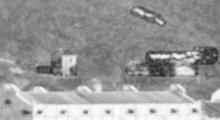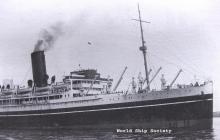Dead House, Kennedy Town [????-????]
Primary tabs
Submitted by David on Thu, 2020-04-09 22:00
Current condition:
Demolished / No longer exists
Old maps of the area, eg the 1905 map, show "Dead House" marked on the map a little way up the hillside above Kennedy Town, It appears to be four buildings set around the edge of a rectangular compound.
Map 1901.3 at http://www.hkmaps.hk/mapviewer.html shows it occupied Inland Lot 1621 (I thought it might be IL 1821, as the second number isn't very clear, but that Lot still exists on Des Voeux Road Central).



Comments
What was the Dead House used for?
To get an idea of what this building might have been used for, we'll look at an older building in Hong Kong, the I Tsz.
Elizabeth Sinn's book Power and Charity - A Chinese Merchant Elite in Colonial Hong Kong explains on p.18-19 that in the 1850s and 1860s the I Tsz had several functions related to the dead and dying among the Chinese population:
1. A community hall to house death tablets.
This was the I Tz's original purpose, also acting as a temporary holding site until a person's death tablet could be returned to their hometown.
2. A temporary holding area for the remains of dead people.
Those remains should be returned to their hometown for burial. In the late 19th century, few of the Chinese residents had been born in Hong Kong, so their hometown was likely somewhere across the border in southern China. As it would take some time to arrange the transport of the remains, they'd need to be stored somewhere in the meantime and the I Tsz provided that service.
3. Short-term accommodation for critically ill people who were about to die.
Quoting Elizabeth Sinn, the I Tsz had "[...] six or eight small rooms at the back of the I-ts'z were let out to dying people. [...] Some of the I-tsz's inmates did survive, but its main purpose was to house the dying. In fact patients who were considered not ill enough were sometimes turned away. [,,,] Underlying this phenomenon was the peculiar Chinese attitude toward sickness and death. It was considered unclean to have someone die in the house."
I'm not sure which of these roles the Dead House in Kennedy Town performed, but I'll make some guesses about the conditions around the start of the 20th century:
So if the I Tsz was taking care of the death tablets and the Tung Wah Hospital was looking after the dying in their hospital buildings, I'll guess the Dead House was handling #2.
There's a possible confirmation in this note about the Tung Wah Coffin Home:
The Tung Wah Coffin Home has its origins in the Slaughter House Coffin Home, which was built next to the Slaughter House Cemetery in Kennedy Town in 1875 with funds from Man Mo Temple and which was initially run by the temple’s general committee, but later brought under the management of Tung Wah Hospital with the public’s overwhelming backing. In 1899, Tung Wah received the support of the government in relocating the facility to its current site in Sandy Bay, at the same time renaming it the Tung Wah Coffin Home.
So was this Dead House the "Slaughter House Coffin Home" mentioned above? I think so - it was certainly close to the Slaughter House (Abbattoir) - but there are a couple of uncertainties:
So I think it was very likely the Slaughter House Coffin Home, but it will need some more investigation.
Re: Tung Wah Coffin Home info
Hi David,
Checke and found there are in fact some information at Tung Wah's own website, but those concerning the Coffin Home are in Chinese only. There are a few PDF files available for download at TWGH's site.
T
Tung Wah Coffin Home, West Point
One summer when I was at school, I went to do voluntary social service at the Boys Club of the Porkfield Road Caritas Community Centre. It was hot and when I was leaving, I was fond of catching some cool breeze from the window of an old building right in front of it at a lower level of the slope. The old building was empty by that time. It had a slanted roof resembling a village house, U-shape, with a courtyard at the front. I did not know what that building was all about. In later years, when I passed by the location, the house had given way to a public basketball court. I believe the Caritas Community Centre was built on the site of the TWCH.
When I was smaller living at Belcher Gardens, Pokfulam Rd, neighbours said that one could hear the keeper of the TWCH calling the spirit to return every night before the door was locked. Fan Lai Lah...Fan Lai Lah... It was too late for me to be up and hear it though.
Lawrence
Re: Tung Wah Coffin Home info
Hi Thomas, thanks for letting me know. I won't be able to read them unfortunately, but do they mention anything about when this building was built?
Carl Smith card 174901 notes a 17 Dec 1875 article in the Daily Press that mentions "a shed at Belcher's Bay used for depositing bodies in coffins when brought from San Francisco." I don't think it's likely to have been the same building as the Dead House, but it may have been its predecessor.
re: Tung Wah Coffin Home, West Point
Thanks Lawrence, the old building you remember for its breeze certainly sounds like a match for this building. Roughly what year would that have been?